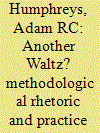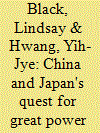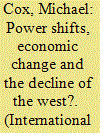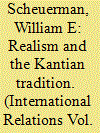|
|
|
Sort Order |
|
|
|
Items / Page
|
|
|
|
|
|
|
| Srl | Item |
| 1 |
ID:
119270


|
|
|
|
|
| Publication |
2012.
|
| Summary/Abstract |
Transnational human rights networks span the globe, and have become more numerous and influential since the 1970s. Yet we still know relatively little about the strategic interaction between transnational advocates and their targeted state actors. Focusing on such a strategic interaction, we argue that transnational advocacy is less a diffusion of authority away from state actors than a change in the ways in which the politics of accountability is conducted between sophisticated state and non-state actors. In particular, we show that targeted actors (e.g. impugned states) can develop their own discursive capacities to challenge the facts and interpretations offered by transnational advocates and 'turn the tables' on them, expanding the scope of accountability to include the conduct of NGOs themselves. Empirically, we examine the efforts made by Human Rights Watch (HRW) to make the Israel Defense Forces (IDF) accountable during the Second Lebanon War of 2006 and the Gaza war of 2008-9.
|
|
|
|
|
|
|
|
|
|
|
|
|
|
|
|
| 2 |
ID:
119271


|
|
|
|
|
| Publication |
2012.
|
| Summary/Abstract |
In responding to piracy in the Gulf of Aden, both Chinese and Japanese policymakers have acted as norm entrepreneurs who intend to transform the dominant norms of international society. Chinese and Japanese norm entrepreneurship is grounded in the ways in which foreign policy actors construct and reconstruct their state identity. In China's case, policymakers have projected China's self-image as a responsible and benevolent Great Power that derives from the Chinese conception of Tianxia. Japanese foreign policy actors, on the other hand, have advanced the notion of Japan as a bridge that mediates between East and West, developing and developed states, members and non-members of international society. Although we do not advocate that Chinese or Japanese norm entrepreneurship should be accepted uncritically, we do maintain that there exist opportunities to combine and develop the multiple approaches that different states promote to problems. This article has shown that dealing with Somali piracy is one such case.
|
|
|
|
|
|
|
|
|
|
|
|
|
|
|
|
| 3 |
ID:
119269


|
|
|
|
|
| Publication |
2012.
|
| Summary/Abstract |
It has become the new truth of the early twenty-first century that the Western world we have known is fast losing its pre-eminence to be replaced by a new international system shaped either by the so-called BRICs comprising Brazil, Russia, India and China, the 'rest', or more popularly by that very broadly defined geographical entity known as Asia. This at least is how many economists, historians and students of world politics are now viewing the future of the larger international system. This essay does not dispute some self-evident economic facts. Nor does it assume that the world will look the same in 50 years time as it does now. It does, however, question the idea that there is an irresistible 'power shift' in the making and that the West and the United States are in steep decline. Specifically, it makes a number of critical arguments concerning the new narrative. First, it suggests that this story, by reasonably focusing on what is obviously changing in the world, unfortunately ignores what is not; as a result, it underestimates what might loosely be termed the continued structural advantages still enjoyed by the United States and its major Western allies. Second, while it is true that many new states are assuming a bigger role in the world economy, their rise needs to be looked at more carefully than it has been so far; indeed, when such an examination is undertaken, it becomes increasingly clear that the rise of others - including China - is still hemmed in by several obstacles, internal as well as external. Third, though the Asian region, and China as part of it, is assuming an ever more important role in the wider world economy, this development should not be seen as marking the beginning of a new Asian Century. This now popular idea is not only conceptually problematic, it inevitably leads to an underestimation of other key areas in the world including incidentally the Transatlantic region. Finally I suggest that if the dubious idea of a power shift is taken to be true, this could very easily lead to greater international insecurity and conflict. Understanding the modern world better than many seem to be doing right now is therefore not only intellectually important; it is strategically necessary too.
|
|
|
|
|
|
|
|
|
|
|
|
|
|
|
|
| 4 |
ID:
119272


|
|
|
|
|
| Publication |
2012.
|
| Summary/Abstract |
In contemporary international political theory, 'Cosmopolitanism' is typically juxtaposed to 'Realism', with many varieties of the former building on Kantian moral and political ideals, and the latter presumably rejecting Kant and his aspiration for far-reaching global reform. In agreement with a growing body of scholarship that seeks to challenge conventional views of Realism, this essay attends to the surprisingly complex views of the Kantian legacy (including Hans Kelsen, perhaps the most important neo-Kantian international thinker in the last century) within its ranks. Not all Realists have been unambiguously critical of Kant, and when in fact they have criticized him, they have done so for many different reasons. First-generation Realists (e.g. E. H. Carr, John Herz, Hans Morgenthau, Reinhold Niebuhr, Frederick Schuman and Georg Schwarzenberger) offered an ambivalent reading of Kantianism consistent with their endorsement of the ultimate desirability of major alterations to the global status quo, whereas second-generation Realists (i.e. Henry Kissinger and Kenneth Waltz) tended to read Kant so as to transform him into a forerunner of their own anti-reformist and institutionally conservative versions of Realism. An examination of Realism's rendezvous with Kantianism not only helps draw a more differentiated portrayal of Realism than is still found in much scholarship, but it also helps us understand how Realism dramatically changed within a relatively short space of time during the immediate postwar decades. It also points to some important potential starting points for a more fruitful exchange between Cosmopolitans and Realists.
|
|
|
|
|
|
|
|
|
|
|
|
|
|
|
|
|
|
|
|
|